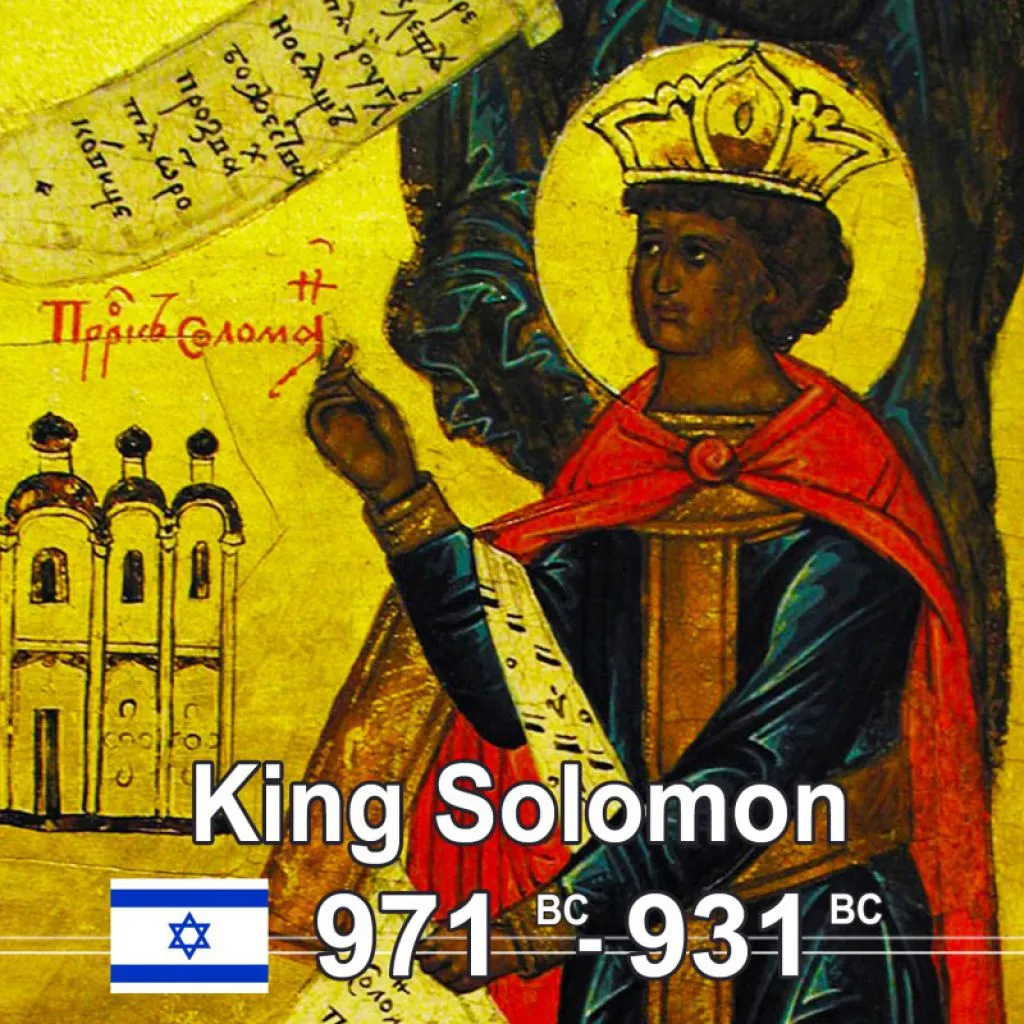
King Solomon
Solomon, also called Jedidiah, was, according to the Hebrew Bible, Quran, Hadith and Hidden Words, a fabulously wealthy and wise king of Israel who succeeded his father, King David.
The conventional dates of Solomon's reign are circa 971 to 931 BCE, normally given in alignment with the dates of David's reign. He is described as the third king of the United Monarchy, which would break apart into the northern Kingdom of Israel and the southern Kingdom of Judah shortly after his death. Following the split, his patrilineal descendants ruled over Judah alone.
According to the Talmud, Solomon is one of the 48 prophets. In the Quran, he is considered a major prophet, and Muslims generally refer to him by the Arabic variant Sulayman, son of David.
The Hebrew Bible credits him as the builder of the First Temple in Jerusalem, beginning in the fourth year of his reign, using the vast wealth he and his father had accumulated. He dedicated the temple to Yahweh, the God of Israel. He is portrayed as great in wisdom, wealth and power beyond either of the previous kings of the country, but also as a king who sinned. His sins included idolatry, marrying foreign women and, ultimately, turning away from Yahweh, and they led to the kingdom's being torn in two during the reign of his son Rehoboam.
Solomon is the subject of many other later references and legends, most notably in the 1st-century apocryphal work known as the Testament of Solomon. In the New Testament, he is portrayed as a teacher of wisdom excelled by Jesus and as arrayed in glory, but excelled by "the lilies of the field". In later years, in mostly non-biblical circles, Solomon also came to be known as a magician and an exorcist, with numerous amulets and medallion seals dating from the Hellenistic period invoking his name.
The life of Solomon is primarily described in the second Book of Samuel, and by 1 Chronicles and 1 Kings. His two names mean "peaceful" and "friend of God", both appropriate to the story of his rule.
CHRONOLOGY
The conventional dates of Solomon's reign are derived from biblical chronology and are set from c. 970 to 931 BCE. Regarding the Davidic dynasty, to which King Solomon belongs, its chronology can be checked against datable Babylonian and Assyrian records at a few points, and these correspondences have allowed archaeologists to date its kings in a modern framework.
According to the most widely used chronology, based on that by Old Testament professor Edwin R. Thiele, the death of Solomon and the division of his kingdom would have occurred in the spring of 931 BCE.
CHILDHOOD
Solomon was born in Jerusalem, the second born child of David and his wife Bathsheba, widow of Uriah the Hittite. The first child (unnamed in that account), a son conceived adulterously during Uriah's lifetime, had died as a punishment on account of the death of Uriah by David's order. Solomon had three named full brothers born to Bathsheba: Nathan, Shammua, and Shobab, besides six known older half-brothers born of as many mothers.
The biblical narrative shows that Solomon served as a peace offering between God and David, due to his adulterous relationship with Bathsheba. In an effort to hide this sin, for example, he sent the woman's husband to battle, hoping that he would be killed there. After he died, David was finally able to marry his wife. As punishment, the first child, who was conceived during the adulterous relationship, died. Solomon was born after David was forgiven. It is this reason why his name, which means peace, was chosen. Some historians cited that Nathan the Prophet brought up Solomon as his father was busy governing the realm. This could also be attributed to the notion that the prophet held great influence over David because he knew of his adultery, which was considered a grievous offense under the Mosaic Law. It was only during Absalom's rebellion when Solomon started spending more time at David's side.
WISDOM
Solomon was the Biblical king most famous for his wisdom. In 1 Kings he sacrificed to God, and God later appeared to him in a dream asking what Solomon wanted from God. Solomon asked for wisdom. Pleased, God personally answered Solomon's prayer, promising him great wisdom because he did not ask for self-serving rewards like long life or the death of his enemies.
Solomon was traditionally considered the author of several biblical books, "including not only the collections of Proverbs, but also of Ecclesiastes and the Song of Solomon and the later apocryphal book the Wisdom of Solomon."
CONSTRUCTION PROJECTS
For some years before his death, David was engaged in collecting materials for building a temple in Jerusalem as a permanent home for Yahweh and the Ark of the Covenant. Solomon is described as undertaking the construction of the temple, with the help of an architect, also named Hiram, and other materials, sent from King Hiram of Tyre.
After the completion of the temple, Solomon is described in the biblical narrative as erecting many other buildings of importance in Jerusalem. For 13 years, he was engaged in the building of a royal palace on Ophel (a hilly promontory in central Jerusalem). This complex included buildings referred to as:
- The House of the Forest of the Lebanon
- The Hall or Porch of Pillars
- The Hall of the Throne or the Hall of Justice
as well as his own residence and a residence for his wife, Pharaoh's daughter.
WIVES AND CONCUBINES
According to the biblical account, Solomon had 700 wives and 300 concubines. The wives were described as foreign princesses, including Pharaoh's daughter and women of Moab, Ammon, Edom, Sidon and of the Hittites. His marriage to Pharaoh's daughter appears to have cemented a political alliance with Egypt whereas he clung to his other wives and concubines "in love".
The only wife mentioned by name is Naamah the Ammonite, mother of Solomon's successor, Rehoboam. The Biblical narrative notes with disapproval that Solomon permitted his foreign wives to import their national deities, building temples to Ashtoreth and Milcom.
In the branch of literary analysis that examines the Bible, called higher criticism, the story of Solomon falling into idolatry by the influence of Pharaoh's daughter and his other foreign wives is "customarily seen as the handiwork of the 'deuteronomistic historian(s)'", who are held to have written, compiled, or edited texts to legitimize the reforms of Hezekiah's grandson, King Josiah who reigned from ca 641 BCE to 609 BCE (over 280 years after Solomon's death according to Bible scholars). Scholarly consensus in this field holds that "Solomon's wives/women were introduced in the 'Josianic' (customarily Dtr) edition of Kings as a theological construct to blame the schism [between Judah and the Northern Kingdom of Israel] on his misdeeds".
RELATIONSHIP WITH QUEEN OF SHEBA
In a brief, unelaborated, and enigmatic passage, the Hebrew Bible describes how the fame of Solomon's wisdom and wealth spread far and wide, so much so that the queen of Sheba decided that she should meet him. The queen is described as visiting with a number of gifts including gold, spices and precious stones. When Solomon gave her "all her desire, whatsoever she asked," she left satisfied
Whether the passage is simply to provide a brief token, foreign witness of Solomon's wealth and wisdom, or whether there is meant to be something more significant to the queen's visit is unknown; nevertheless the visit of the Queen of Sheba has become the subject of numerous stories.
Sheba is typically identified as Saba, a nation once spanning the Red Sea on the coasts of what are now Eritrea, Somalia, Ethiopia and Yemen, in Arabia Felix. In a Rabbinical account (e.g. Targum Sheni), Solomon was accustomed to ordering the living creatures of the world to dance before him (Rabbinical accounts say that Solomon had been given control over all living things by Yahweh), but one day upon discovering that the mountain-cock or hoopoe (Aramaic name: nagar tura) was absent, he summoned it to him, and the bird told him that it had been searching for somewhere new.
The bird had discovered a land in the east, exceedingly rich in gold, silver, and plants, whose capital was called Kitor and whose ruler was the Queen of Sheba, and the bird, on its own advice, was sent by Solomon to request the queen's immediate attendance at Solomon's court.
An Ethiopian account from the 14th century (Kebra Nagast) maintains that the Queen of Sheba had sexual relations with King Solomon and gave birth by the Mai Bella stream in the province of Hamasien, Eritrea. The Ethiopian tradition has a detailed account of the affair. The child was a son who went on to become Menelik I, King of Axum, and founded a dynasty that would reign as the first Jewish, then Christian Empire of Ethiopia for 2,900+ years until Haile Selassie was overthrown in 1974. Menelik was said to be a practicing Jew who was given a replica of the Ark of the Covenant by King Solomon; and, moreover, that the original was switched and went to Axum with him and his mother, and is still there, guarded by a single priest charged with caring for the artifact as his life's task.
The claim of such a lineage and of possession of the Ark has been an important source of legitimacy and prestige for the Ethiopian monarchy throughout the many centuries of its existence, and had important and lasting effects on Ethiopian culture as a whole. The Ethiopian government and church deny all requests to view the alleged ark.
Some classical-era Rabbis, attacking Solomon's moral character, have claimed instead that the child was an ancestor of Nebuchadnezzar II, who destroyed Solomon's temple some 300 years later.
According to the Hebrew Bible, Solomon is the last ruler of a united Kingdom of Israel. He dies of natural causes at around 60 years of age. Upon Solomon's death, his son, Rehoboam, succeeds him. However, ten of the Tribes of Israel refuse to accept him as king, splitting the United Monarchy in the northern Kingdom of Israel under Jeroboam, while Rehoboam continues to reign over the much smaller southern Kingdom of Judah. Henceforth the two kingdoms are never again united.















































